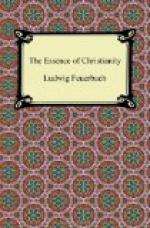|
This section contains 7,099 words (approx. 24 pages at 300 words per page) |

|
SOURCE: Banks, Robert. “Ludwig Feuerbach: Still ‘A Thorn in the Flesh of Modern Theology’?” Evangelical Quarterly 44, no. 1 (January-March 1972): 30-46.
In the following essay, Banks probes Feuerbach's continued influence on contemporary Christian theology.
In 1841, with the publication of Das Wesen des Christentums, Ludwig Feuerbach issued his dramatic and highly original reinterpretation of the Christian religion. In that work, which presupposed a broadly empirical understanding of reality and approach to knowledge, he developed by means of his theory of projection both a critique of religion, insofar as it created a realm in which man's innermost needs and desires were imaginatively objectified, and a defence of it, insofar as it dealt with that which truly belonged to the essence of mankind. “Religion”, he wrote, “is the dream of the human mind. But even in dreams we do not find ourselves in emptiness or in heaven, but on earth, in the realm...
|
This section contains 7,099 words (approx. 24 pages at 300 words per page) |

|


